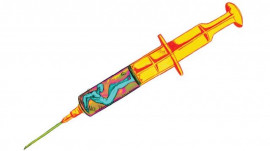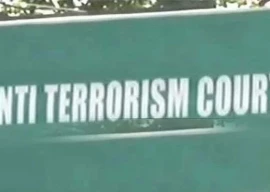
A drive around the city reveals the largess with which these cattle vendors have set up shop in almost every locality. Forget the traffic woes, a stench has enveloped the city as well. Malir, Gulshan-e-Iqbal, North Nazimabad, Nazimabad, Liaqatabad, Federal B Area, Burnes Road, Kharadar, Orangi Town, SITE, Qasba Colony, New Karachi, Safoora Goth, Landhi, Steel Town, Tipu Sultan Road, Clifton and Defence are housing these illegal cattle pens.

"At Paposh Nagar, there is an empty plot squeezed between residential apartments where a cattle pen is set up every year," said Asim Khan, a resident of the area, pointing out the stench of animal waste wafting around the place. "No one dares stand up to the owners."
Not only do these illegal markets create traffic gridlocks, they also compromise the security of the surrounding areas. "These pens are a serious menace," said commissioner Shoaib Siddiqui. "We have directed the deputy commissioners (DC) to crack down on the owners, who are often from outside the city and may pose threats to the residents."
He admitted that there was a need to coordinate with the law enforcement agencies and the Karachi Metropolitan Corporation.
Central DC Dr Saifur Rehman has made some attempts to remove the cattle pens. According to a press statement issued by his office, 39 people have been arrested for establishing illegal cattle pens, with FIRs registered against them under Section 188 of the penal code.
However, Khan, a resident of district Central, does not have a high opinion of Dr Rehman's efforts. "Look around the district - what you'll see will contradict what the DC's office says," he said. "There are pens left unchecked on every street corner, just like in the other parts of the city."
Meanwhile, East DC Samiuddin Siddiqui told The Express Tribune that several owners of illegal pens had been arrested for violations of Section 144. "We have arrested at least 25 such owners under Section 188 as part of our drive against these markets," he claimed. "They mostly establish their pens in roadside areas, fleeing when law enforcement officials reach the site. After the raid, they return and set up shop again."
However, far from taking action against the merchants, it seems that police officials often take advantage of the ban to line their own pockets. A cattle trader from Shahdadpur, selling his animals at an illegal pen near Dalmia Road, told The Express Tribune that he obtained permission from the local police station. "A police mobile from the station visits the market every day, and each vendor has to pay them Rs200 as a bribe," he explained.
Many cattle markets have also been set up in the areas administered by the cantonment boards, normally considered well-controlled and smoothly-run. Cantonment Board Clifton vice-president Aziz Suharwardy said that a crackdown had already been initiated in the area. However, he too added that traders merely came back after raids.
"All these markets are established with the permission of political parties, the police and KMC itself," a Karachi Cantonment Board source informed The Express Tribune on the condition of anonymity. "In fact, the market behind the Finance and Trade Centre was established by a retired army man!"
Lawyer Muhammad Abdul Azeem said that although the administration had imposed Section 144 and was registering cases under the Pakistan Penal Code to prevent the setting up of illegal cattle pens, these attempts were useless. "The government cannot do much under Section 188, since the culprits only go to jail for a month or pay a fine of Rs700," he explained. "They must give harsher punishments if they want to get rid of these markets."
The looming threat of Congo virus
With two people dead and a third affected by the deadly Congo virus, KMC’s municipal department has yet to wake up to the threat. Not only has it failed to curb the illegal cattle markets, it has also not made arrangements for veterinary camps to prevent the spread of the virus around the city.
Officials from the provincial health department, including the health secretary, have written to the executive district officer of health, stating that threat of the virus could multiply during the Eidul Azha season and requesting him to take steps to address the issue.
However, neither the district administration, nor the KMC or the police have taken any action to stop the sale of sick animals or to establish veterinary camps to check the animals.
Despite several attempts to contact KMC senior municipal services director Masood Alam, he had not responded till the time of filing of this story.
Published in The Express Tribune, September 30th, 2014.

1731476617-0/Sandra-Oh-(2)1731476617-0-165x106.webp)















COMMENTS
Comments are moderated and generally will be posted if they are on-topic and not abusive.
For more information, please see our Comments FAQ